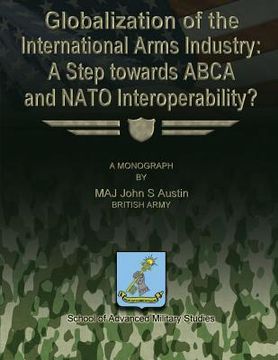Share
Globalization of the International Arms Industry: A Step Towards ABCA and NATO Interoperability?
British Army John S. Austin
(Author)
·
School Of Advanced Military Studies
(Contributions by)
·
Createspace Independent Publishing Platform
· Paperback
Globalization of the International Arms Industry: A Step Towards ABCA and NATO Interoperability? - Studies, School Of Advanced Military ; Austin, British Army John S.
Choose the list to add your product or create one New List
✓ Product added successfully to the Wishlist.
Go to My Wishlists
Origin: U.S.A.
(Import costs included in the price)
It will be shipped from our warehouse between
Monday, July 22 and
Monday, July 29.
You will receive it anywhere in United Kingdom between 1 and 3 business days after shipment.
Synopsis "Globalization of the International Arms Industry: A Step Towards ABCA and NATO Interoperability?"
This paper explores the relationship between globalization of the arms industry and interoperability. Its premise is that while the arms industry has undertaken significant steps to globalize, NATO and ABCA military force interoperability levels remain woefully inadequate. Over sixty years ago NATO and the ABCA program sought to standardize the militaries of their member nations. Each member country agreed to take steps to ensure that interoperability among force elements was achieved. A truly globalized arms industry offers a platform to achieve greater standardization and interoperability amongst joint and combined forces. In fact, it is clear that a nexus should exist between a globalized arms development and truly interoperable forces. This study examines the relationship between a globalized arms industry and interoperable armed forces within the context of NATO and the ABCA program. The primary vehicle it uses to do this is a case study of the development and procurement of the Joint Strike Fighter (JSF). The study concludes that four barriers bar the development of interoperable forces. First, defense spending has significantly reduced for all members of NATO and ABCA, with the exception of the United States. Second, democratically elected leaders are unable to justify increased defense spending in financially constrained times. The absence of an identifiable external threat to the sovereignty of nation states is paramount in politician's minds. Thirdly, the proliferation of defense technologies to third parties prevents the arms industry from achieving interoperability of systems. Finally, little emphasis is placed on the importance of non technical interoperability. The requirement of forces to train together and understand differing military cultures and doctrine is often overlooked. The absence of joint and combined training prior to conducting operations has limited the ability of international forces to operate together effectively. Critically, wherever possible, NATO and ABCA forces must achieve both technical and non technical interoperability in order to remain effective within the contemporary operating environment.
- 0% (0)
- 0% (0)
- 0% (0)
- 0% (0)
- 0% (0)
All books in our catalog are Original.
The book is written in English.
The binding of this edition is Paperback.
✓ Producto agregado correctamente al carro, Ir a Pagar.

